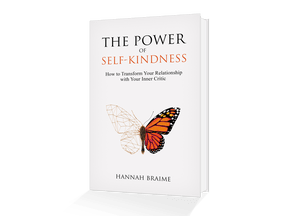Hannah Braime's Blog, page 3
January 6, 2019
The 2019 Personal Growth Read-a-Long
Happy New Year, friends! I hope your 2019 is off to a wonderful start. I’ve been taking slower holiday season as an opportunity to make all the plans for this year, enjoy some gorgeous walks with my husband and daughter, and complete a few works-in-progress of my new favourite hobby: knitting! (seriously, so therapeutic and satisfying).
The last two years, I’ve shared reading challenges based on general interest and personal growth (I also shared my favourite books from 2018 in last week’s post). This year, I thought I’d do something different to clear the backlog of books I have on my “to read” list that I keep meaning to read (and want to read!) but haven’t yet made time to do so.
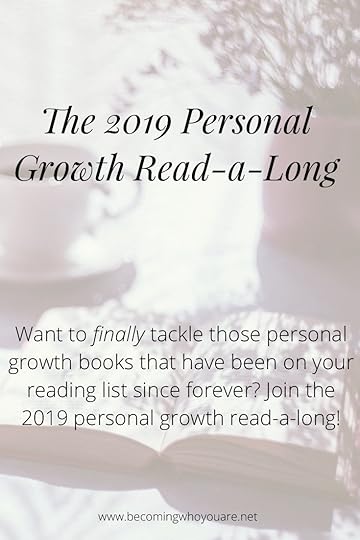
Here’s what I’m thinking: it could be even more fun and interesting to do this together! I’m planning to share share my progress and thoughts about each book on Instagram as I go, so if you’d like to join me you can do so here. Below, I’m sharing the books I’ve chosen for each month, but I’m sure you have your own list of titles that have been languishing on your to-read list for ages too, so feel free to substitute your own choices!
To prevent this read-a-long becoming overwhelming, I’m aiming to chow down on one book a month. I read much more than this, but I’ve found with personal growth books that time to digest is good. Some of the books I’m tackling are fairly meaty topics so I want to give myself space to spend the time on them that they deserve without feeling crunched to get to the finish line. As you’ll see, some months I’ve added two choices as I’m not sure which one I want to go for yet. If I’m feeling optimistic, I’ll aim for both :)
Without further ado, here are my must-read/will-read personal growth books for 2019:
January: The Power of Self-Kindness // From Coping to Thriving by… MeOK, so this is a cheat entry: I have read these books before, just a few times ;). I include them here because one of my intentions for this year is to start making my books more accessible and inclusive by creating large print and workbook versions. This is one of those important-but-not-urgent tasks that I pushed down my to-do list for most of last year, so in January, I’m going to start by re-reading and reviewing these books to figure out the best way to make these versions happen.
(N.B. If you’ve already read these, may I also suggest this is the perfect time of year to begin The Year of You: 365 Journal-Writing Prompts for Creative Self-Discovery :)
February: The Four Tendencies by Gretchen Rubin
The Four Tendencies by Gretchen RubinAs unscientific as most of them are, I love me a good personality test (
March: The End of Self-Help by Gail Brenner
The End of Self-Help by Gail BrennerHonestly, I’m not sure I’m going to love this book (the description makes me wonder whether it’s going to be another personal growth publication of the spiritual-bypassing ilk) but the title makes me curious. As a self-help (or shelf-help ;) writer, I’m interested to get the author’s take on the self-help movement and what she suggests as an alternative.
April: The Last Lecture by Randy Pausch
The Last Lecture by Randy PauschI have heard this book recommended so many times and haven’t gotten around to reading it yet, partly because let’s face it: death is a bummer. But I think there is something incredibly powerful about reading words written by someone who knows they are at the end of their life and the perspective that brings. I’m planning to use this as a memento mori and a reminder of what’s most important in life.
May: The Body Keeps the Score by Bessel Van der Kolk
The Body Keeps the Score by Bessel Van der KolkThis is another book that has been on my reading list since forever. And this is the year I will finally read it (yes, I will!). I have avoided it so far as the topic (how our bodies store trauma and alternative ways of healing from trauma that don’t involve drugs) feels quite heavy and like it could make for uncomfortable reading. Frankly, that’s a terrible reason not to read it as the heaviest/most uncomfortable topics often end up being the most important and impactful. Since I became a mother, I’ve been thinking a lot about how trauma can be passed down through generations and my own responsibility to limit this as much as I can, so this feels like the right time.
June: Positivity by Barbara Frederickson
Positivity by Barbara FredericksonI thought it would be good to counter-balance May’s meaty topic with some positive psychology this month. While I didn’t love the couple of books I read by Martin Seligman, I got a lot of value from  The Happiness Advantage by Shawn Achor, so I’m interested to check out Barbara Frederickson’s work and hopefully give this over-thinker a refresher on the importance of optimism.
The Happiness Advantage by Shawn Achor, so I’m interested to check out Barbara Frederickson’s work and hopefully give this over-thinker a refresher on the importance of optimism.
 The Gift by Lewis Hyde
The Gift by Lewis HydeWhile I’m not sure if this technically counts as a personal growth book per se, it’s interesting to consider how we view the relationship between creativity and commercialism, and how this impacts how we perceive our own creations and our identity as a creative person. Having coached dozens of writers and artists over the past 18 months through Coach.me, I’ve been thinking a lot about the marrying of creativity and commercialism, so I’ve chosen this book for July to hopefully broaden my perspective.
August: The Secret Life of Pronouns //
The Secret Life of Pronouns //  Opening Up by Writing It Down by James Pennebaker
Opening Up by Writing It Down by James PennebakerJames Pennebaker is one of the leading researchers and authors in the field of journaling and while I’ve heard a lot about his research through second-hand sources and reading online papers, I’m embarrassed to say I have yet to actually read any of his books. It’s definitely time to correct this! Having enjoyed studying a bit of language and linguistics at university, The Secret Life of Pronouns book seems like a fascinating insight into the power of words and an opportunity to geek out about one of my favourite topics, while I’m hoping Opening Up by Writing It Down will give me some additional tools to add to my journaling toolbox.
September: Owning Your Own Shadow by Robert A. Johnson
Owning Your Own Shadow by Robert A. JohnsonThis is another book I’ve wanted to read for a long time but have also avoided because it has felt rather heavy. The shadow is a topic that fascinates me and, as I wrote about in The Power of Self-Kindness, is something that can have a huge influence on our lives whether or not we acknowledge its existence.
October: Born to Be Good by Dacher Keltner
Born to Be Good by Dacher KeltnerI’m drawn to this book because it’s not positive psychology per se, but it is an in-depth look at all the positive emotions that make us human. Based on the description and reviews, it might not contain as many personal takeaways as some of the other books on this list, but it sounds like a feel-good read that should be interesting and informative.
November: The Dance of Anger //
The Dance of Anger //  The Dance of Fear by Harriet Lerner
The Dance of Fear by Harriet LernerI’ve heard so many good things about Harriet Lerner’s books and November will be the month I tackle at least one of the two that have been on my reading list the longest (although  The Mother Dance also feels very relevant!) The Dance of Fear is all about dealing with feelings of anxiety, fear and shame in our lives, while The Dance of Anger is about developing a healthy relationship with anger.
The Mother Dance also feels very relevant!) The Dance of Fear is all about dealing with feelings of anxiety, fear and shame in our lives, while The Dance of Anger is about developing a healthy relationship with anger.
 The Art of Comforting by Val Walker
The Art of Comforting by Val WalkerThere have been so many instances where someone I know has been dealing with pain or grief and I’ve felt tongue-tied, clumsy, or even not said anything at all for fear of saying the wrong thing. I enjoyed reading  There Is No Good Card for This a couple of years ago, and I’m hoping this book will also be a good primer on how to overcome a fear of saying the wrong thing to connect with someone during difficult times and meet them where they are.
There Is No Good Card for This a couple of years ago, and I’m hoping this book will also be a good primer on how to overcome a fear of saying the wrong thing to connect with someone during difficult times and meet them where they are.
If I have time, I will also try to squeeze in: by Joseph Burgo (a psychotherapist’s exploration of defence mechanisms and the ways in which they impact our lives) and  On Death and Dying by Elizabeth Kubler-Ross (a psychological study of the effect imminent death has on patients, practitioners, families and all involved).
On Death and Dying by Elizabeth Kubler-Ross (a psychological study of the effect imminent death has on patients, practitioners, families and all involved).
So that’s my reading list for this year. Care to join me? Want to do your own monthly read-a-long with a different selection of books? As a quick reminder, I plan to share my progress on Instagram, so head on over to share your read-a-long commitment with me, and let’s get reading :)
Photo by freestocks.org on Unsplash
The post The 2019 Personal Growth Read-a-Long appeared first on Becoming Who You Are.








 Related Stories‘The Power of Self-Kindness: How to Transform Your Relationship with Your Inner Critic’ is Out Now!The Solution to Self-Criticism is Never More CriticismThe Powerful 3-Word Phrase That Makes Me a Better Person
Related Stories‘The Power of Self-Kindness: How to Transform Your Relationship with Your Inner Critic’ is Out Now!The Solution to Self-Criticism is Never More CriticismThe Powerful 3-Word Phrase That Makes Me a Better Person
December 28, 2018
My Favourite Books from 2018
Happy holidays! I hope you’re enjoying a fun few days of festivities and hopefully some R&R too (or not so much? You might find this and this helpful).
In this post, I want to share some of my favourite books from this year, Before we get to those, however, if you’re looking for some additional holiday reading over the next week or so, may I suggest one or more of my books? (#cheekyplug)
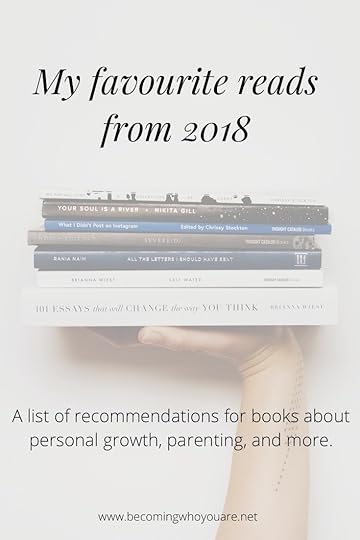
The Power of Self-Kindness: How to Transform Your Relationship with Your Inner Critic
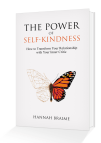 Using a combination of theory, insight and reflective practices, you’ll learn where your critic comes from and how to look beyond its destructive words to uncover the real message underneath. Whether you’ve been struggling with your inner critic for a long time or are at the beginning of your self-kindness journey, this book offers a range of approaches and suggestions you can use to mend the most important relationship in your life: the one with yourself.
Using a combination of theory, insight and reflective practices, you’ll learn where your critic comes from and how to look beyond its destructive words to uncover the real message underneath. Whether you’ve been struggling with your inner critic for a long time or are at the beginning of your self-kindness journey, this book offers a range of approaches and suggestions you can use to mend the most important relationship in your life: the one with yourself.
From Coping to Thriving: How to Turn Self-Care Into a Way of Life
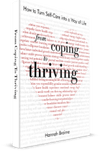 This is a comprehensive guide to making self-care part of your everyday life. With a balance between practical suggestions, coaching-style questions and psychological groundwork, From Coping to Thriving is designed to give you the self-knowledge and awareness you need to start integrating self-care into your life, instead of integrating self-care around your life.
This is a comprehensive guide to making self-care part of your everyday life. With a balance between practical suggestions, coaching-style questions and psychological groundwork, From Coping to Thriving is designed to give you the self-knowledge and awareness you need to start integrating self-care into your life, instead of integrating self-care around your life.
Not only does the book contain hundreds of useful tips and ideas to get you going, it will also take you deeper into related topics like habit-formation, coping strategies and dealing with resistance to self-care.
The Year of You: 365 Journal-Writing Prompts for Creative Self-Discovery
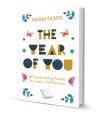 The Year of You is an invitation to discover more about yourself, become more conscious about what you want, and create a rich and fulfilling life through one journaling prompt a day. With this book, you can take the guess work out of journaling and use one writing prompt each day of the year to explore and unpack the most important aspects of your life and your being.
The Year of You is an invitation to discover more about yourself, become more conscious about what you want, and create a rich and fulfilling life through one journaling prompt a day. With this book, you can take the guess work out of journaling and use one writing prompt each day of the year to explore and unpack the most important aspects of your life and your being.
You can start in January, June or November; simply turn to today’s date and start writing! Whether you’re new to journaling or have enjoyed a reflective writing practice for some time, The Year of You offers a wealth of inspiration that will deepen your understanding and awareness of what makes you who you are.
If you have bought and/or reviewed one or more of my books this year, thank you! I hope you enjoyed it/them. Your support helps me keep writing and keep this site going, and I appreciate each and every purchase
Right, on to the rest of the post! Here are a few of my favourite reads from the last 12 months:
Personal Growth
 The Top Five Regrets of the Dying: A Life Transformed by the Dearly Departed by Bronnie Ware
The Top Five Regrets of the Dying: A Life Transformed by the Dearly Departed by Bronnie Ware
Part memoir, part personal growth book, this is an expansion of Bronnie Ware’s article of the same name that went viral a few years ago. Working as a palliative care nurse, Bronnie became deeply involved with her patients and heard about their life stories, accomplishments, memories, and deepest regrets. The book is structured around five of these regrets (for example “I wish I’d had the courage to live a life true to myself, not the life others expected of me,”) and she encourages us to become more conscious of how these decisions influence our own lives so we can live fully in the present.
When we’re going through some kind of failure or rejection, it’s easy to feel like we’re the only ones in the sticky middle of this experience. Alexandra Franzen decided to change that and collected stories from a wide range of people with all kinds of backgrounds and professions about their worst professional experiences and how they got through them. Even if you’re not in the pit of turmoil or career crisis right now, I love the fact this book gives you the courage to realise a) s*** happens, and b) you will survive.
 Embracing Your Inner Critic: Turning Self-Criticism Into a Creative Asset by Hal and Sidra Stone
Embracing Your Inner Critic: Turning Self-Criticism Into a Creative Asset by Hal and Sidra Stone
I came across this book while researching for The Power of Self-Kindness and found it to be an insightful and illuminating exploration of the inner critic. Through the framework of their voice dialogue therapy, Hal and Sidra Stone explain how to recognise the inner critic and how to overcome its negative effects so we can work with it, rather than in spite of it.
 The Secret Lives of Introverts by Jen Granneman
The Secret Lives of Introverts by Jen Granneman
Jen Granneman is the founder of Introvert, Dear and this book is a guide to this personality type—both for introverts themselves and for the people who love them. She talks about introvert behaviours, character traits, introverts in relationships and careers and more. Her aim is to encourage people to embrace their introversion in its many forms, rather than trying to force ourselves to be someone we’re not.
Parenting
 Buddhism for Mothers: A Calm Approach to Caring For Yourself and Your Children by Sarah Napthali
Buddhism for Mothers: A Calm Approach to Caring For Yourself and Your Children by Sarah Napthali
Although I’m not a buddhist, I was drawn to this book because I saw the value in applying practices like mindfulness and loving-kindness to parenting. This book is a good introduction to some of the ways buddhist principles can have a positive influence on our patience, presence, self-care, and overall parenting experience.
This is a fascinating book that shines a light on how the way we parent is informed by our own childhood and experience of being parented ourselves. More than anything, it’s about coming to terms with our own stories so rather than parenting by default and repeating the same patterns, we can become more mindful of how our behaviour towards our kids affects them and deal with parenting challenges in a compassionate and constructive way.
 How to Talk so Little Kids Will Listen: A Survival Guide to Life With Children Age 2-7
How to Talk so Little Kids Will Listen: A Survival Guide to Life With Children Age 2-7
This book is co-authored by the daughter of the woman who wrote the original version of this book, How to Talk so Little Kids Will Listen (and Listen so Little Kids Will Talk), and her childhood best friend. They adapt the principles from the original book to apply to younger kids aged 2-7 and offer some helpful perspectives on communicating with younger kids in a respectful, connected, and collaborative way.
 No Bad Kids: Toddler Discipline Without Shame by Janet Lansbury
No Bad Kids: Toddler Discipline Without Shame by Janet Lansbury
Similar to How to Talk so Little Kids Will Listen, No Bad Kids is about how to communicate with young children (and especially toddlers) in a respectful way, setting boundaries without resorting to threats, punishment, or non-peaceful behaviour. The book is a collection of easy-to-digest essays from her blog, janetlansbury.com.
General Interest
 Hillbilly Elegy: A Memoir of a Family and Culture in Crisis by J.D. Vance
Hillbilly Elegy: A Memoir of a Family and Culture in Crisis by J.D. Vance
Coming from a middle-class British background, hillbilly culture is something I know nothing about beyond generalised stereotypes, so this book was eye-opening, fascinating and deeply moving. The memoir of a man who grew up in a poor Rust Belt town and went on to graduate from Yale Law School, his reflections not only on his chaotic family but the culture surrounding them make for riveting reading.
 This is Going to Hurt: Secret Diaries of a Junior Doctor by Adam Kay
This is Going to Hurt: Secret Diaries of a Junior Doctor by Adam Kay
Adam Kay spent several years working as a junior doctor in the NHS (the UK’s healthcare system) before leaving the medical profession for good. His abridged diaries from that time are laugh-out-loud hilarious, cringe-worthy, sad, and shed light both on the realities of what aspiring doctors go through to become qualified, the best and worst of human nature, and the trials and tribulations of operating within a huge, ever-more-debt-ridden system. The email debacle, the misread ultrasound, and the health assistant’s unorthodox way of checking a pulse are a few of my favourite face-palm-inducing anecdotes.
What have you read and enjoyed this year? Leave a comment and share your thoughts!
Photo by Thought Catalog on Unsplash
The post My Favourite Books from 2018 appeared first on Becoming Who You Are.









December 16, 2018
‘The Power of Self-Kindness: How to Transform Your Relationship with Your Inner Critic’ is Out Now!
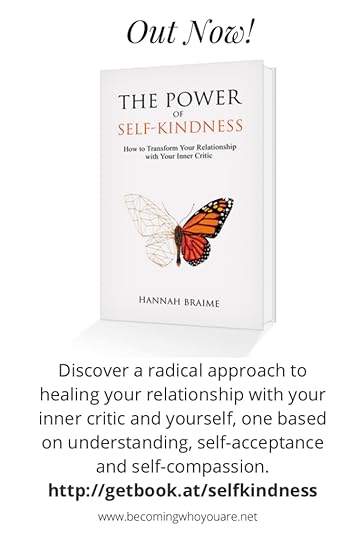
I’m excited and really pleased to share The Power of Self-Kindness: How to Transform Your Relationship with Your Inner Critic is out today!
Even if you call it by a different name, you need no introduction to your inner critic.
This is the voice – or voices – who can take you down a peg or two (or several) with one well-aimed blow. Our inner critics seems to know exactly what to say and when to say it for maximum effect. It’s a master of the psychological KO, leaving us feeling like the smallest, most flawed, most disempowered version of ourselves.
You’ve tried everything to tame your inner critic: ignoring it, calling names and telling it to shut up. But none of those approaches have worked.
Now, it’s time to stop fighting yourself.
In The Power of Self-Kindness: How to Transform Your Relationship With Your Inner Critic, you’ll discover a radical approach to healing your relationship with your inner critic and yourself, one based on understanding, self-acceptance and self-compassion.
Using a combination of theory, insight and reflective practices, you’ll learn where your critic comes from and how to look beyond its destructive words to uncover the real message underneath. You’ll develop techniques that will help you question your critic’s stories and become more mindful of how these stories impact your life. You’ll also learn how to turn up the volume on the inner critic’s positive counterpart – the inner mentor – a wise inner guiding light invested in your growth and wellbeing.
Whether you’ve been struggling with your inner critic for a long time or are at the beginning of your self-kindness journey, this book offers a range of approaches and suggestions you can use to mend the most important relationship in your life: the one with yourself.
The book is available now in ebook and paperback through Amazon (audiobook also coming soon!). Find out more and get your copy here.
Working on my relationship with my inner critic has changed my life for the better. I really hope it’s useful for you too!
The post ‘The Power of Self-Kindness: How to Transform Your Relationship with Your Inner Critic’ is Out Now! appeared first on Becoming Who You Are.









December 9, 2018
Do You Think Your Inner Critic is a Gremlin? Think Again.
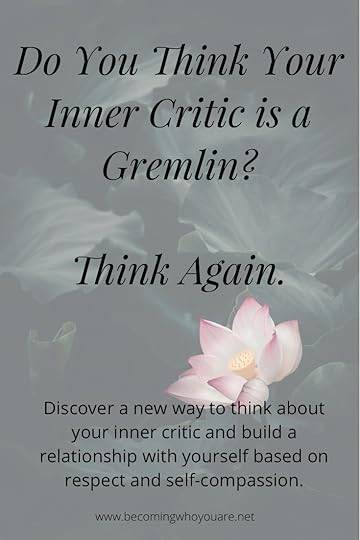
This post is adapted from my upcoming book ‘The Power of Self-Kindness: How to Transform Your Relationship With Your Inner Critic.’ The book is about changing the way you relate to yourself and especially your inner critical voice, not by telling it to shut up, calling it names or ignoring it, but by learning to relate to all aspects of yourself with self-compassion and self-acceptance . If you’d like to hear more when the book is available, subscribe to receive updates.
I’ve tried calling my inner critic names, laughing it off as my inner gremlin or mean girl, or labelling it as a monster—something inside me that needs to be fixed. I’ve tried ignoring it, telling it to shut up, telling it to go away. But none of those things helped. My inner critic can always out-shout, out-argue and out-manoeuvre me.
Much conventional advice about how to deal with the inner critic says the name-calling/ignoring/fight back approach is the way to go. Perhaps you’ve tried this, and it hasn’t worked. Perhaps it works to a degree but talking to a part of yourself like this doesn’t quite sit right with you. If this is the case that’s for a good reason. In this post, I want to introduce the idea that your inner critic isn’t the monster it might appear to be.
We all know that the foundation of all good relationships is respect. I don’t like it when someone calls me names or tells me to shut up, so why would I expect that to work with my inner critics? If someone is doing this to me, is it going to help if I call them names and tell them to shut up back? No! It’s just going to make things worse and escalate the situation.
Taking this perspective helped me realize: I won’t change my relationship with my inner critics by descending to their level. Instead, I’d much rather invite my critics to rise to meet me and model what the right way to interact looks like.
Whatever form your inner critic takes (and whatever the specifics of what it says) its overarching purpose is to keep you in line with your “rules for living”. Its job is to sound the alarm whenever there’s a chance you might do something that contravenes these rules and stop you in our tracks before you act in a way that breaks them. When you look at the inner critic in this context – that it’s trying to keep you in check with the rules you developed to survive – you can see its purpose from a different angle altogether.
Inner Critics Need Hugs TooEven when it leaves us feeling miserable, the inner critic is trying to protect us. It might not be going about it in the most constructive or helpful way, the rules its upholding might be outdated, and it is almost certainly working to scripts that are no longer helpful, but its modus operandi is self-protection. As I’ve become more aware of my thoughts, feelings and beliefs, I’ve discovered that most of my fears and hang-ups come back to two roots: the fear of not being good enough and the fear of being unlovable. The inner critic’s fears and hang-ups are no different.
“In considering where the Inner Critic came from, always keep in mind that the Inner Critic’s original function is to spare us shame and pain.”
—Hal and Sidra Stone,
Embracing the Inner Critic
This is why my inner critic is most likely to show up when I’m doing something that takes me outside my comfort zone. Like the time I interviewed for a job I wanted and was still awake at 2 a.m. the morning after, deconstructing everything I should have said and second-guessing myself. Or the time I got my first writing client and avoided their emails for days, paralysed with fear about what would happen if they didn’t like my work. Or the countless times I’ve been in a social situation with opportunities to connect with new people yet haven’t felt able to speak up for fear of those people judging me.
These are just some of the (many) examples of how my inner critic has shaped the way I respond to situations outside my comfort zone. I’m sure you can think of your own. Going for a promotion, asking someone out, moving to (or even visiting) a new place, trying that new hobby you’ve always wanted to try; whether the situation is seemingly trivial or life-changing, your inner critic is always there trying to keep you in your safe zone and deter you from doing anything that feels risky, leaves you vulnerable or breaks your internalized rules for life.
Our inner critics sound scary, but in reality they are scared.
Our choice is: do we live a life ruled by fear? Or do we take back the reigns, decide what matters most to us (love, integrity, honesty, justice, creativity, etc.) and enjoy a life fully-lived?
Photo by Clarence E. Hsu on Unsplash
The post Do You Think Your Inner Critic is a Gremlin? Think Again. appeared first on Becoming Who You Are.









December 2, 2018
3 Tools to Stop the Spiral of Self-Recrimination
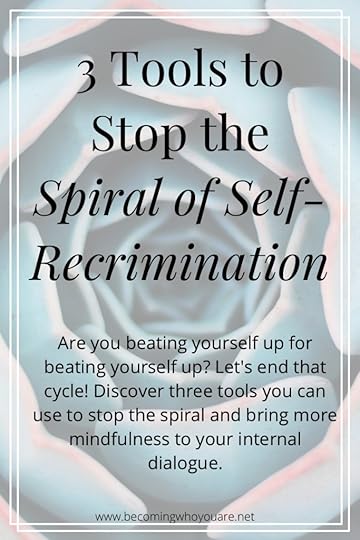
This post is adapted from my upcoming book ‘The Power of Self-Kindness: How to Transform Your Relationship With Your Inner Critic.’ The book is about changing the way you relate to yourself and especially your inner critical voice, not by telling it to shut up, calling it names or ignoring it, but by learning to relate to all aspects of yourself with self-compassion and self-acceptance . If you’d like to hear more when the book is available, subscribe to receive updates.
I’m walking down the street and my thoughts drift to a conversation I had with a friend the evening before, in which I said something that came out awkwardly and not as I had intended. As I think more about the situation, my thoughts start to descend into a doom-and-gloom disaster scenario: She’s going to think you were criticising her, she’s bound to be offended . . . in fact, she’s probably talking to her partner right now about how weird you are and how she doesn’t want to be friends with you anymore!
My inner critic is taking over although I’m so lost in its stories I don’t even realize. Then, another thought rings through, clear as a bell, Oh, come on, this again? You know better than this, you’re just not trying! Didn’t you just read a book about this? What was all that therapy for if you’re still getting stuck on things like this? You need to stop this self-indulgent BS. Grow up! It’s an inner critic pile-on. Not only is my critic taking control of my thoughts about the evening before, but it’s also admonishing me for the fact it exists.
This is the spiral of self-recrimination.
The spiral looks like this: we self-attack, then self-attack for self-attacking, then self-attack for self-attacking our self-attack, then self-attack for self-attacking our self-attack our self-attack . . . and on and on into infinity. This is just another way the inner critic justifies its existence – to turn on itself. Because, if you experience an inner-critic attack, then obviously you need an inner critic to keep you in line and protect you from that in the future, right? That’s inner-critic logic for you.
Here are three tools I’ve found useful for noticing and stopping the spiral before it becomes a vortex. These tools revolve around gaining emotional distance from your inner critics and recognising that while your inner critics are part of you, they are just one of many different parts. They are not you and they don’t define you or represent you as a whole.
You’ll notice none of these tools try to change what my critics are saying or convince myself to feel differently about them. Instead, they are about witnessing my thoughts and feelings and creating space for self-acceptance in the moment.
1. I Notice . . .Reframing your critics’ assertions with this (for example, “I notice I’m telling myself everyone is judging me negatively,” or “I notice my inner critic is telling me I’m not good enough” can help you get some much-needed emotional distance from this internal voice. It’s a short and simple phrase, but “I notice” can help you become an observer of your thoughts rather than a participant in them. This is especially the case if you tend to accept what your inner critics say as truth without question.
When I frame what my inner critics say with “I notice . . .” I can practise watching their statements float by without believing them but also without judging them or trying to shut them down. It allows my critics to express themselves, but within a safe container.
2. Ouch!Saying to yourself “Ouch!” whenever you’re aware of harsh self-talk is a way of acknowledging the impact your critics are having on you without getting caught up in trying to argue with them or prove them wrong. The act of stopping and saying this out loud (or muttering it under your breath) can help snap you out of a critic spiral and creates space for a more constructive and self-compassionate part of your internal dialogue to emerge (such as your inner mentor, whom I talk about more in the book).
I first heard about using this phrase as a way of diffusing tension during arguments, but I’ve found it useful for taking the heat out of what my inner critic is saying and remembering to empathize with myself rather than buy into its stories.
3. In Your Opinion . . .In the TV show The Good Wife, a recurring judge character insists the defence and prosecution frame their arguments with the phrase, “In my opinion . . .” rather than stating them as facts like they usually do. Any statement of fact is met with the following interruption:
“Is that your opinion?”
“Well, yes . . .”
“Then say. ‘In my opinion’.”
While this is a comic character quirk, it’s also a turn of phrase you can started using with your inner critics (and outer critics – although perhaps just in your head). Framing my critics’ statements with “In your opinion . . .” helps take the heat out of what they are saying and reminds me they are just one of many parts of my internal dialogue. And, like fictional attorneys on TV, just because they have an argument or an opinion doesn’t mean it’s a fact.
As well as gaining emotional distance, you will likely find being able to name and acknowledge your feelings and thoughts brings its own sense of relief. Doing this might not change the thought or feeling but recognizing what’s happening can lessen the intensity of the experience.
How do you halt the spiral of self-recrimination when you notice it’s happening? Leave a comment and share your thoughts.
Photo by Yousef Espanioly on Unsplash
The post 3 Tools to Stop the Spiral of Self-Recrimination appeared first on Becoming Who You Are.









November 25, 2018
4 Lies Your Inner Critic Tells You (and the Truth Behind Them)
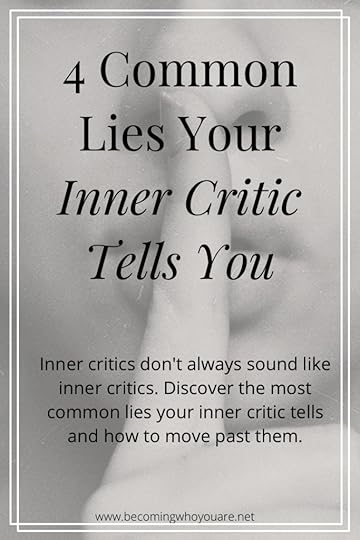
This post is adapted from my upcoming book ‘The Power of Self-Kindness: How to Transform Your Relationship With Your Inner Critic.’ The book is about changing the way you relate to yourself and especially your inner critical voice, not by telling it to shut up, calling it names or ignoring it, but by learning to relate to all aspects of yourself with self-compassion and self-acceptance . If you’d like to hear more when the book is available, subscribe to receive updates.
One of the most challenging and frustrating aspects of my inner critic is that sometimes I’m not even aware it’s my critic that’s talking. Our critics are masters at coming up with different ways of being heard and attempting to maintain control over our lives. In this post, I’m sharing four of the most common lies you might hear from your inner critics.
1. You’ll Be Good Enough When . . .The “you’ll be good enough when . . . [you lose 10lbs/get that promotion/can afford that car/get that degree/etc.]” mantra is pernicious and can appear in several guises. One of these is “when . . . then . . .” thinking. For example, “When I get that job, then I’ll feel successful/When I have a partner, then I’ll feel happy/When I buy that dress I saw online, then I’ll feel beautiful.” The tricky thing about this thought pattern is that it doesn’t always sound like a criticism. In fact, sometimes, it sounds more like “Yeah, go you! You get that job! You find that partner! You buy that dress!”
The problem with the meaning underlying all of the above, is that it tells you, “You are not good enough as you are.” Well, hello there, inner critic.
Here’s the truth: You will never be good enough for your inner critic.
This doesn’t mean you will never be good enough, period. Good enough is subjective and part of transforming your relationship with your inner critic is taking back the reins and deciding for yourself what “good enough” means to you, rather than leaving it up to the frightened, out-of-control, unreasonable voice in your head.
I’ve found “good enough” is a shifting bar that changes depending on the day, what is happening in my life, my energy levels, my emotions and many more factors. It isn’t set in stone; it’s an agreement I make with myself.
2. Without Me, You’ll Never Get AnywhereIn last week’s post, I talked about the different types of inner critic. One of mine I call ‘my inner taskmaster.’ My inner taskmaster tells me I need to work harder, faster, and better. It says I don’t do enough, and maybe if I did more my inner critic would disappear and I’d finally feel good enough. (Notice how many of these inner critic messages thread together?) It also comes up with countless variations on lie number two: you need me to push you; without me, you’d sit on your behind watching Netflix and eating Ben & Jerry’s all day.
If you have a similar inner voice, it’s worth remembering: of course your inner critic will tell you that you need it! After all, you’re doing all these things, coming up with all these big ideas and daring to dream all these big dreams every single day that send it into a flurry of panic and fear. This isn’t your fault; it’s your place to do, think and dream big. But, as I explain in the book, your inner critic thinks it needs to protect you and keep you small.
It’s also important to remember the mantra: Just because your inner critic says it, doesn’t mean it’s true. In fact, if your inner critic says it, it’s almost certainly not true.
3. Only You Struggle With This/Feel This WayIf your inner critic were a person walking around and speaking to you like it does in the real world, you would likely describe that person as abusive. And trying to make out you’re the only one who is crazy/weird/stupid/ridiculous/whatever enough to feel this way or struggle with whatever your struggling with is one of the oldest tricks in the abuser book.
Something that helped me question this story was remembering that even the most challenging and uncomfortable experiences I have are far more common than I might think. When I’m having a bad day, I make a mistake or my inner critic is running wild, it’s tempting to look at other people with their successful lives, beaming smiles, and peppy social media updates, and think I am the only one in the whole wide world experiencing this right now. But that’s my inner critic talking.
In her book, Self-Compassion, Kristen Neff explains that the Latin root of the word compassion means “suffering with”, and that these darker, more uncomfortable aspects of the human experience are threads that connect you and I to everyone else in the world. Even if the external situations around us differ wildly, our feelings, fears, hopes and dreams are things we share with others and the things that connect us all. If we’re willing to bring them to light, they can bring us closer together too.
4. You Must Be Special/Fit InWhich one your inner critic goes for will depend on your culture and upbringing. If you live in a culture like the USA, it’s the former. In other cultures (such as some European cultures), you’re more likely to experience tall poppy syndrome (where people perceived as superior are more likely to be resented, criticized and cut down). Standing out is discouraged and criticized.
Being ordinary is more than okay – some of your most special and meaningful life experiences will come out of “ordinary” moments and daily life. But if you have big things – goals and dreams – that’s fine too. As long as they are motivated by what you want, not by needing to feel special, good enough, because of FOMO or because of any other negative-rooted, striving-based reason.
Which of these statements do you recognise from your inner critic? Are there any others you’d add to the list? Leave a comment and share your thoughts.
Photo by Kristina Flour on Unsplash
The post 4 Lies Your Inner Critic Tells You (and the Truth Behind Them) appeared first on Becoming Who You Are.









November 19, 2018
The 7 Types of Inner Critic – Which One(s) Do You Recognise?
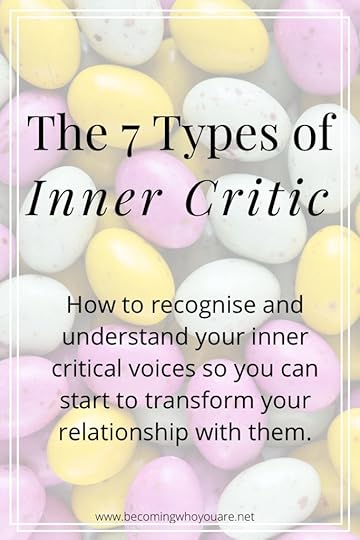
This post is adapted from my upcoming book ‘The Power of Self-Kindness: How to Transform Your Relationship With Your Inner Critic.’ The book is about changing the way you relate to yourself and especially your inner critical voice, not by telling it to shut up, calling it names or ignoring it, but by learning to relate to all aspects of yourself with self-compassion and self-acceptance . If you’d like to hear more when the book is available, subscribe to receive updates.
We talk about our inner critic in the singular but most, if not all, of us have several critical voices in our heads, each with a different modus operandi. Even though the situations in which they show up – and how they try to manipulate our behaviour are different – they all aim to keep certain aspects of our personality hidden away from the outside world.
In an article on their website, psychotherapists Jay Earley and Bonnie Weiss outline seven types of inner critic. Look at the following list and notice which kinds of inner critic are present for you:
• The perfectionist: Sets high, usually unobtainable, standards and struggles to call things completed or finished.
• The underminer: Undermines your self-confidence and abilities so you stay small and don’t take risks.
• The guilt-tripper: Criticizes you for past wrong-doings and lives by the standards set by your family, community or culture.
• The molder: Tries to get you to fit a certain shape or standard set by your family, community or culture, and fears showing your true self will lead to rejection and abandonment.
• The destroyer: Attacks your self-worth, says you are inherently flawed and undeserving of basic respect and understanding.
• The taskmaster: Pushes you to keep going and fears if you stop, you will become lazy or other people will judge you as a failure (I write about my own experiences with my inner taskmaster later).
• The inner controller: Tries to control your impulses around things like eating, drinking, spending and sex – often resorting to harsh tactics to do so (you might recognize this inner critic in the gym scenario I described earlier in this chapter).
As you read this list, you might have an inkling which inner critic is loudest for you. Perhaps, like me, you experience more than one depending on the situation. Right now, you don’t need to do anything with this information—start by simply noticing what comes up for you and when.
It feels important to say here that having a vocal inner critic(s) isn’t a reflection on your worth or value as a person. Your critic is just one voice in your head and not representative of you as a whole. A common experience is we start exploring our inner critics and find we are criticising ourselves for even having an inner critic. Oof; double whammy.
As I explain in the book (and will share more about in a future post here), your inner critic—however destructive—is trying to help you in its own misfiring, twisted way. It’s working with outdated beliefs and information (and its tactics and manner leave a lot to be desired). But having one or more inner critics is not a sign you are broken or that there is something wrong with you… it’s actually a sign you are good at adapting and surviving.
Food for thought.
The post The 7 Types of Inner Critic – Which One(s) Do You Recognise? appeared first on Becoming Who You Are.









November 4, 2018
Join Us for the 2018 Becoming Who You Are Advent Calendar

It’s that time again… the 2018 BWYA Advent Calendar is almost here!
The Calendar is a set of 25 prompts leading up to Christmas. It’s a review of the year that has been and an opportunity to dream and scheme for the year to come. It’s a chance for you to add some reflective time to a busy period and create space to consciously evaluate 2018 while exploring what you want from 2019.
With the prompts, you’ll also receive a weekly suggestions for activities and practices that will help you stay connected to yourself.
The calendar series starts on 1st December. It’s free to register and much better for you than chocolate, so I hope you’ll join us in bidding adieu to 2018 and laying some solid intentional groundwork for the next 12 months.
Register here:
The post Join Us for the 2018 Becoming Who You Are Advent Calendar appeared first on Becoming Who You Are.









October 31, 2018
11 Tips for Finishing Nanowrimo (and Any Big Creative Project)
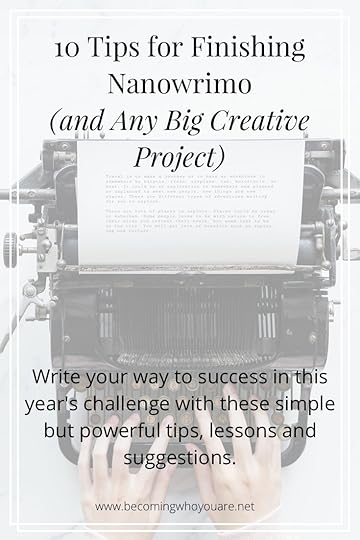
It’s almost November, which means it’s almost time for another Nanowrimo! If you’re not familiar with it, Nanowrimo stands for “National Novel Writing Month.” Every November, thousands of people around the world attempt to write a 50,000 word novel in 30 days, or approximately 1,667 words per day for the whole month. Brilliant? Crazy? Probably a little bit of both.
These kinds of sprint projects tend to divide opinion. On the one hand, the risk of burnout is real, even within a month. There is also a good chance you could produce higher quality work if you take your time and slow down the writing process.
On the other hand, having a hard deadline is a powerful motivator. If you’re been wanting to write a novel, have a project in mind, or have a big creative goal you want to kickstart, the structure of Nanowrimo could be exactly what you need to make it happen. As I’ve written about here before, confidence comes from action (not the other way around), and Nano is a month of serious action. Whatever the final result looks like, knowing you’ve written 50,000 words in 30 days feels really good.
I’ve attempted a Nanowrimo four times now and finished twice. While I don’t consider myself any kind of Nano expert, I have learned a lot from both my unsuccessful attempts and the times I’ve finished, and I want to share some of these lessons with you today.
This post is primarily geared towards Nanowrimo, but you can transfer these ideas to any big creative project beacuse—spoiler alert!—90% of it comes down to mindset. If you’re attempting Nanowrimo this November or have another big creative project up your sleeve you’d like to bring to fruition before the year-end, I hope you find it helpful :)
1. Plan as much in advance as you canYou might have heard of the distinction between “plotters” (people who outline their characters and story before writing) and “pantsers” (people who just start writing and fly by the seat of their pants as they go). The approach you choose is up to you, but I found the times I outlined to be much easier than those I didn’t.
Nano is intense. 1,667 words per day for 30 days (on top of everything else we have going on in our regular lives) is a lot. You can have an idea of what you want to write and still be spontaneous within that structure, but having an outline means you can spend your time in November upping that word count versus twiddling your pencil while thinking about what to write. If you’re using something like Scrivener or Ulysses to write your novel (both of which I have used and 100% recommend), you can set up your chapters with their outlines in advance so when the 1st arrives you’re ready to go.
2. Don’t just make it a priority, make it a non-negotiableIt’s so simple, but the number one difference between times I finished Nanowrimo and times I didn’t was my internal commitment. The first two times, I thought “I’ll try” the other times I thought “I will.” I planned better, showed up, and did what I needed to do to get to 50K.
The times I stopped short, a bajillion other things ended up being more important and I fell behind. When I made it a non-negotiable part of my daily routine, that changed. Think of things you do every day without fail: eating breakfast, brushing your teeth, checking your email – and make your Nano project one of those things.
Decide now when you’ll do your writing each day, schedule it in, block it off on your calendar, tell everyone around you you’ll be unavailable at that time, or whatever else you need to do to make that happen.
3. Plan for every eventualityA lot will happen in a month and you should go into this assuming distractions, hiccups, and make-or-break obstacles will happen at some point. Plan for this now.
On days when you can’t write at your normal time, what will you do then? What about weekends? What about holidays like Thanksgiving (if you celebrate)?
It might not feel necessary to think right now about what you’ll do in three weeks time when you’re in a sweet potato pie haze and haven’t done that day’s word count, but it is. Decide “if/when X happens, then I’ll do Y” now, not when X actually happens and you’re under pressure.
4. Take the WYCWYC approachBecause best laid plans often fall apart, on the days when I needed to write and didn’t have time, I took the “What you can, when you can” approach.
I wrote on my phone when I was waiting in line, when my daughter was napping, when I was on public transport, whenever I had a spare moment. Two minutes here and there might not feel like much, but it can add up to several hundred words over a day. Find the cracks in your day, that dead time when you’re waiting, your mind is wandering, and you have a couple of moments to make progress.
5. Get ahead earlyI had an intercontinental move and the launch of my last book during last year’s Nano so it wasn’t exactly the ideal time to write a novel.
But let’s face it: when is?
I knew I would have days where I couldn’t meet my target so I racked up extra days when I could. The first few days, when my motivation was high and I was excited about the book, I rode that wave and used it to get ahead. Which was good, because…
6. Focus only on the very next step…That motivation and excitement? It will disappear at some point. I found I crashed around the halfway mark, when the novelty was waning, it felt like I had done sooooo much writing, I was bored with my story, yet I still had over 50% to go. Each writing session felt lacklustre, I was sure my book wasn’t going anywhere, and the whole process was starting to feel like a big dragging chore.
I got through this period by gamifying my writing sessions. Days when I wasn’t feeling it, I would tell myself I could stop after 30 minutes. By the time I got to 30 minutes, I was usually on a roll and determined to get that day’s quota in. But I also figured any words were better than no words, so when the 30 minutes were up, I also gave myself permission to stop—even if I hadn’t reached my word count for that day.
7. Don’t try to do it allAccept some things will fall by the wayside during the month and remember this is just for now. You might not stay on top of your laundry, your social life might stagnate temporarily, and you might be eating microwave dinners for a couple of weeks.
And you know what? That’s OK for now. The point of Nano is it’s a sprint, not a permanent way of living.
8. Get support and accountability—if it’s helpfulTell people, join your local Nanowrimo groups, get support from a writing coach (hi!) with one big caveat: if it will be helpful.
Some people find the public Facebook declaration useful for keeping them on track. I personally find committing to stuff like this publicly (e.g. on social media) shifts the balance of pressure from internal to external, which leaves me feeling more anxious than motivated. Ditto with the online Nanowrimo groups (there are sub-groups all around the world where you can meet local Nano writers and get together to write). I know people who find them incredibly motivating and love the social aspect—and I think that’s great!—but I’ve found I fare better when I keep my eyes on my own novel and just get on with it (#introvert).
Think about what’s worked for you in the past when you’ve worked towards stretch goals. If public accountability has been a powerful and positive motivator, try it. If not, find what feels good and do that instead.
9. Embrace the “shitty first draft”Although the aim of Nanowrimo is to write a novel during November, this summary is a tad misleading. The reality is it’s a first draft. You are not supposed to have a polished, publishable piece of work at the end of the month.
Accept this now: most, if not all, of your Nano novel will probably be pretty terrible. And that’s OK, because the end of Nano is far from the end of your journey.
The way I see it is you need to get all the bad and cringe-worthy writing out of the way first before you can get to the good stuff. You can’t edit nothing, so rather than feeling discouraged by each plot hole, cliched character, or tangled storyline, see it as progress.
10. Remember: everything passes.Nano is intense, demanding and an emotional rollercoaster. You will have times of joy and times of frustration, days when you feel invincible and days when you feel like you’re at the bottom of the pile.
Like all emotions, this too shall pass. Make the most of the highs and ride out the lows and keep in mind that at some point you will finish (yes, you will!).
11. Have fun!If you’ve signed up for this wild ride, you might as well make the most of it. It won’t always feel fun. In fact, it will often feel distinctly un-fun.
But the rewards are huge. You will learn a ton about yourself, about writing, about what it takes to set a bananas goal and reach it. And, if you get to the end, you’ll also have the first draft of a novel. A novel! So do what you can to make it fun. Find ways to gamify, join the community if you want and, whatever the outcome in terms of word count, try to get as much out of the experience as you can.
If you’re attempting Nanowrimo this year, good luck! You can do this and I’m cheering you on.
If you’d like extra support as you work on your novel, I invite you to try coaching. I work with writers and bloggers to develop the habits that will help them reach their biggest creative goals (including Nanowrimo). If you’d like to see how coaching could support you and your writing, you can try a week for free by clicking here and entering the code HANNAHBRAIMEWEEK.

The post 11 Tips for Finishing Nanowrimo (and Any Big Creative Project) appeared first on Becoming Who You Are.









October 21, 2018
10 Questions to Ask Yourself When Making a Big Decision
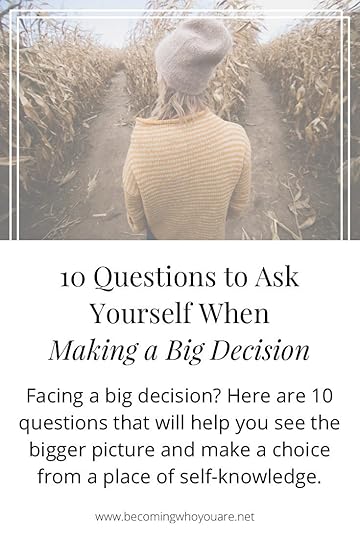
“The more I think about it, the more it seems we don’t really have a decision-making crisis. We have a self-knowledge crisis. How can we decide who or what to say yes or no to until we know what matters to us?”
‘How to Live a Good Life‘ by Jonathan Fields
We tend to think of big decisions on a 500-foot view level: it’s either this or it’s that. You take the job or you don’t. You leave the relationship or you stay. You apply for the course or defer it until next year. You book that ticket for the trip of a lifetime or keep saving for a deposit on a home.
This kind of microscopic X or Y thinking can make these decisions feel impossible because you don’t have a crystal ball that will tell you how things will work out. Moreover, many of these kinds of decisions aren’t about the situations themselves, but about you.
Many of the path-not-taken decisions we end up making (or avoid until they are made for us—not the best approach!) are less about the practicalities of the choice that’s in front of you, and more about questions like: What matters to you? How does this decision fit within the broader scope of your life? How can you tell the difference between what you think you should do and what you want to do? What motivations and desires are driving this decision?
In other words, they require you to zoom out from the 500-foot view to the 35,000-foot view. Instead of limiting your vision to the individual cars and houses below you, you expand your sights to the swathes of countryside and towns, stretching for miles towards the horizon. As Jonathan Fields describes in the quote above, issues with big decisions are less about the details and more about self-knowledge.
With that in mind, I want to share ten questions I’ve found helpful for making big decisions. You can answer all ten or pick the ones that resonate most for you. Either way, I hope they are helpful!
Does this bring me closer to or take me further away from my values?How will I feel about the potential outcomes in 10 years time?What will my future self thank me for?WWXD? Think of a person you admire or a role model. What would they do and why? You don’t have to do the same as them, but this can be a useful thought experiment.What is my ideal outcome here? E.g. “I want to move in with my partner and have the independence to take trips on my own, pursue my hobbies, etc.” Thinking about your ideal outcome in a given situation can open up possibilities you haven’t yet considered.What strengths am I bringing to this decision?What internal motivations are driving this decision? And what external motivations are? Internal motivations are things like wanting a sense of mastery, wanting to meet certain needs, and about your relationship with yourself etc. External motivations are more about how other people see you and your relationship with the external world. So an example of internal motivation would be: I want to feel accomplished at this skill. An example of external motivation would be: I want people to think I’m great at this skill.If I were free to do whatever I wanted, with no judgment or repercussions, what would I do?What will change in other areas of my life because of making this decision? And what will stay the same?What would happen if I did nothing?What questions do you find helpful for tackling big decisions? Leave a comment and share your thoughts.
The post 10 Questions to Ask Yourself When Making a Big Decision appeared first on Becoming Who You Are.












